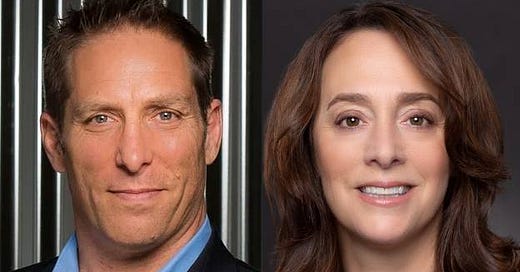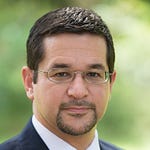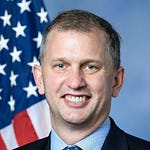Rural community pushback to new wind and solar farms has the potential to slow the US clean-energy transition, but very little research has been done on what rural Americans actually think about renewable energy. A recent survey of thousands of rural residents about their opinions on climate change and clean energy development sheds some light; in this episode, Robin Pressman of Embold Research and Mike Casey of clean-energy PR firm Tigercomm discuss the results.
Text transcript:
David Roberts
Of the handful of forces that have the potential to stymie the clean-energy transition in the US, perhaps the most immediate and dangerous is rural NIMBYism. Rural communities will, by necessity, host most of the wind and solar farms the US needs to decarbonize, but rural resistance is already responsible for dozens of canceled projects and growing delays.
What do rural Americans think about renewable energy? Where are they getting their information and what sorts of arguments are getting through? There’s been weirdly little research on this question, despite the growing severity of the problem.
Into that breach comes a new poll done by Embold Research, which surveyed thousands of rural residents to uncover their opinions on climate change, wind and solar power, and the promises of energy developers. The poll was commissioned by the clean-energy PR firm Tigercomm, which also interviewed community engagement staff at energy developers to find out what they’ve been hearing in the field.
I contacted Mike Casey, the president of Tigercomm, and Robin Pressman, the head of Embold Research, to discuss what the poll found and what it means for clean energy developers engaging these communities.
All right then, with no further ado, Mike Casey of Tigercomm and Robin Pressman of Embold Research. Welcome to Volts. Thank you both so much for coming.
Robin Pressman
Thanks for having us.
Mike Casey
Thank you, Mr. Roberts.
David Roberts
Mike, let's start with you. Let's just talk a little bit about the background here. There are kind of two bits of research here that we're going to discuss today. On the one hand, Robin's firm has done this polling of rural Americans. I hate that I'm going to have to say the word rural over and over again in this podcast. It's my least favorite word to say. But also, your firm has done a bunch of interviews with developers, renewable energy developers, specifically the people at the renewable energy developers who are responsible for going into these communities and developing these projects.
It's sort of the advanced people who are going out to talk with the rural people and live in that world. And I'm interested in both those perspectives. But maybe actually, Robin, let's start with you. So, tell us a little bit about what this poll did, who it polled, and what kinds of things you were asking about.
Robin Pressman
So, we wanted to take a look at your favorite word, "rural," Americans and understand perspectives on renewable energy. We've seen a lot of polls lately that look at the country as a whole, that look at specific communities where projects are being built. We're certainly polling for people in those local communities and areas. But what we really wanted to do was to get sort of a 30,000-foot view across the country of what perspectives rural Americans have, where they are at this point in time, and how they're feeling about the renewable energy transition that is happening. And so we surveyed 2,645 rural Americans across the country, and we were able to have conversations with them, both the quantitative survey and then also the qualitative, get information from them that they could fill in so we could learn a little bit more about their perspective.
So, sort of virtual conversations, not actual conversations. And we were able to really get a look and understand where they are and go beyond just sort of the loudest voices in the room, which has really been a big stumbling block in these communities, to getting these projects built.
David Roberts
In the small handful of items that I would list as threats to the success of the clean energy transition, threats to the success of IRA and all the rest of the bills, NIMBYism and permitting is probably the biggest and most threatening one. And so everybody's thinking about this right now. Everybody in the energy world is thinking about this right now. And one of the big questions I think that's on everybody's mind is this resistance that we're seeing, is it a small handful of people that are being paid by right-wing groups stirring up this trouble, or are they speaking in some sense on behalf of a broader sentiment?
In other words, are they articulating the true sentiments of people in those areas? So maybe the place to start is just what did you find out, that they think about renewable energy?
Robin Pressman
So, to start with, there is support for these projects, both solar and wind in rural communities. And support does outweigh the opposition as a whole. When we ask people, do you support or oppose solar energy and wind energy projects separately being built in the following areas, communities across your state, in your local community, or on a property near yours, we could see that support does outweigh opposition across the board. As you get a little closer to on properties near yours, you would expect to see some of the support drop off —
David Roberts
Your backyard.
Robin Pressman
Right, and the opposition increase, but not nearly as significantly as we thought it would.
And so there is sort of a core group of people that are opposed, certainly, but it's not as strong as one might think. It tends to hover between 10% and 25%, depending on how proximate the project is to you. And we can see that, for example, when we ask in your local community, we can see strong support, 37% strongly support solar and 32% somewhat support it. And for wind, similarly, 30% strongly supporting, 26% somewhat supporting. So, there's real opportunities here for having the conversations. But when we dug in underneath the top line data, what we can see is some real differences.
And interestingly enough, while, as you might expect, Republicans tend to be more opposed to these projects than Democrats, we see a real difference between MAGA Republicans and non-MAGA Republicans.
David Roberts
Are those self-designations? Like, these are people who self-identify as MAGA Republicans?
Robin Pressman
Yes. We ask them their party identification. And for those people who self-identified as a Republican, we then ask them if they identify as a MAGA Republican. And about 28% of the entire sample identified as MAGA Republican. And so what we see with those non-MAGA Republicans, we see real opportunity for growth. And we already have pretty strong support with independents as well. So, there are some groups there that we can talk to that are either already supportive or maybe sort of soft supporters who, when given and educated a little bit more information about understanding the impact on the community, are going to become stronger supporters.
We also similarly saw interesting difference between people who self-identified living in a small town or a rural area.
David Roberts
Wait, those are two distinct things.
Mike Casey
Yes, and an important distinction actually.
David Roberts
Spell that out a little bit. When people choose between those, what are they saying?
Robin Pressman
So, this is a self-determination. So, when we created this survey, we looked at a number of things. We looked at the rural areas based on subcounty designations and then ZIP codes based on population density, to be sure that we really were talking to people in rural areas, and we are overwhelmingly so. But there are small towns, right? Within these communities, there are one-stoplight towns. There's a main street, there are shops, there's a coffee shop where people are coming. And the people who are living more closer into the small towns tend to be stronger supporters than the people who are further out, right where these projects are more likely to be built.
David Roberts
That's funny. One of the things that we keep finding is that more density equals bluer, and that seems to hold at every level. Even out here in the rural areas, these smaller distinctions in density seem to matter.
Robin Pressman
Yes, but they're not entirely blue. These are areas still, that even in the small towns, these are areas that voted, still voted for Trump overwhelmingly. Right. So, these are definitely red; they're just not as strong. But what we see is people who help build the fabric of our communities, who maybe run the small shops in town, or you know, work at the local buildings, are going to see some opportunities for growth and benefit overall. And we sort of started in the middle of this conversation and I should have premised this with this is, it's really important, the context for understanding where rural Americans are right now.
And that is that they're decidedly downbeat. I mean, half think that the country is off on the wrong track, and we can dig into this further in a little bit. But their perspectives on their communities, in terms of economic opportunities, job opportunities are really, really downbeat. And so people are seeing a need for something that's going to be beneficial for their communities, but they're not necessarily believing yet that renewable energy is going to be that solution for them.
David Roberts
Interesting. Well, the big question to me, I mean, politically speaking, the big question here is about intensity. Like anyone who follows politics, I think, knows that wide, broad, shallow majority support cannot stand up to narrower, smaller, but more intense opposition. Right? Because intensity is what brings people out to meetings. Intensity is what makes them speak up. And if you're just sort of like mildly in favor when you're asked, that's not going to get you out to the meetings. So, do you have any way of measuring or judging the intensity of this sort of majority support versus the kind of concentrated MAGA opposition?
Robin Pressman
Yeah, well, we can see is, like I said, when we look at some of these questions and we look at strong supporters versus those that may somewhat oppose, we can see that there is opportunity for growth. And when we look at those who just identify that they're not sure on a series of measures there is real opportunity for education and growth there, we can see that maybe when we start talking about specific aspects of what these projects are going to bring to their communities, you get about 20-25%, about a quarter saying that they're not sure what the implications are going to be for their communities as it relates to, say, tax benefits, for example. So this really opens up opportunities for conversations.
And here's the important point: It's conversations with culturally credible messengers. Having companies come from outside is not necessarily welcomed or appreciated in a lot of these communities. Identifying folks that are from those communities, specifically farmers and ranchers, small business owners who can have these conversations with their friends, with their neighbors, really carry significantly more weight. There's some perspectives that we were able to uncover in the survey that really just look at how rural Americans perceive themselves as it relates to the country, and they perceive that they're looked down upon. They think that elites, liberal elites from the coasts are looking down upon them.
They think that the politicians aren't paying attention to them and their needs, and they're not feeling understood in that. And so those are really important points. And so when you have outsiders coming in and making promises of tax benefits, and here's all this opportunity we're going to bring, they're decidedly suspect of that, as you might imagine, rightfully so, given their experiences and where they're coming at it from. But importantly, as we begin to share more of that education, of the information, of the opportunities that it can bring, we are able to build a coalition of supporters in these communities.
Mike Casey
So, there's actually some good news here. The good news is that the poll that Robin's firm ran, that we were part of in terms of commissioning it and socializing it, mirrors what the Berkeley National Lab study in 2019 found as well. So, they looked at people who were neighbors of existing wind farms. Three miles, one mile, half mile radius. Half mile is less than most of your dog owning listeners walk their dogs at night. And among people who lived within a half mile of a wind turbine, 51% had a very positive or positive experience. 24% had a very negative or negative experience.
That's actually worth taking into account. Wind is typically viewed as triggering greater opposition than solar. That was found in our poll. But yet among those who live next to it, they don't mind.
David Roberts
I mean, 51% is — I guess that's good news. Half and half. It's not great news.
Mike Casey
Well, actually, no, check that out, though. So, 51% very positive or positive, 24% very negative or negative.
David Roberts
Right?
Mike Casey
So it's a two to one ratio. That's actually a significant gap. And the point here is that you are right: Of the nine barriers to the clean energy transition, critical minerals, grid stability, physical infrastructure, transmission, workforce development, supply chains, government, storage, permitting is the most likely transition killer. No question. Yet people who live next to it, once it gets built, it is readily accepted. All the data show that. And the even better news is that what renewable energy can offer rural communities is an almost exact match with what rural Americans say they want for themselves and their neighbors.
They want lower energy prices, they want jobs so their young people can stay in the community, and they want tax revenue to address aging infrastructure. That's exactly what renewable energy offers.
David Roberts
That's what they say on the poll that they want. That's where you're getting up.
Mike Casey
Correct.
David Roberts
I think this is a pattern of NIMBY opposition, not just to wind and solar, but to urbanist projects. And I mean, name it. It's almost always the case that afterward, everyone's fine. Everyone's fine with the thing. It's the same with, like, a bike lane. Like, after the bike lane's built, everybody loves the bike lane. It's always that way. But that never seems to translate into making it any easier to build the next bike lane. Do you know what I mean and like so the fact that people are happy with wind farms once they're next to them, how do you translate that into making it easier to sell the next wind farm?
That's the magic here. Mike, I have a bunch of questions for you about engaging with this, but just a couple more for Robin. Did you, on your poll run by these rural people, specific arguments for and against renewable energy? And if so, I'm just curious what arguments against it are catching on and grabbing people's minds? And conversely, what are the arguments for it that actually sway them?
Robin Pressman
Absolutely. So, starting with what people are really for, some of the messages that really resonated focus on the fact that we're going to move away from dependence on foreign sources for energy. The increase in renewable energy decreases our energy dependence on other countries, which resonates, as well as the diversification of the grid. Renewable energy helps diversify our sources of energy, ensuring that the lights stay on even if one energy source fails. So, those really rise to the top. Some of the economic arguments that we tested in this poll didn't work quite as well. And I think that partly there's a "not sure" component here.
As I mentioned earlier, about a quarter identified some of the tax benefits.
David Roberts
You mean in terms of local economic benefits that these things bring?
Robin Pressman
Yeah, exactly. And so there's some education and because it's generic. So, we've seen in other polls where we've gone into very local communities and asked the question related to specific projects that we could name that are nearby and received greater support. So, to some extent, by asking it in a generic sense, they're not sure. They're wanting to get more information.
David Roberts
Right.
Robin Pressman
And so the opportunities will increase as we go into these communities and we can serve up these messages again, relying on people from within the community, people who have gone ahead and had projects built in their backyard or on their land and are benefiting from it, to be able to share some of that experience with their neighbors.
David Roberts
Right. Speaking of trusted messengers, people from those communities.
Robin Pressman
Yes, absolutely.
David Roberts
Because it seems to me like a general rule that these sort of abstract principles that you kind of will say you're in favor of in a poll like energy independence and things like that, those things, in my experience, tend to crumble pretty quickly in the face of, "But this will hurt you specifically." And so I'm curious, what are the — you know, if I'm a right-wing group and I'm going into one of these communities to try to stir up opposition — what are arguments am I using that are working? What triggers people?
Robin Pressman
Yeah. So, one of the greatest concerns people have is that renewable energy cannot currently meet our energy needs. And that really rises to the top of concerns. You also see some people have concerns about the use of farmland and that the benefits and energy are actually going to go elsewhere, that their community is not going to be the one to really benefit to the extent as other communities will. There is definitely skepticism at this point about renewable energy fully meeting those needs. But again, opportunities exist for education where we can see that people are identifying as either somewhat disagreeing or not sure, and we can go in and educate folks on those benefits.
David Roberts
Well, it seems to me that rural communities in the US have good, historically grounded reasons to think that energy companies might come in and treat them like a resource colony, mess up their land, and extract all the benefits, because that's basically what fossil fuels have done everywhere they've gone in rural US. You know, why wouldn't you think that seems quite sensible to me. So, Mike, you and your colleagues are out talking to people at renewable energy developers who are now having to deal with this. And this, I think, is not totally new, but there's certainly a rising level of opposition and just the significance and the importance of the whole thing, it's just rising.
And when I think about the renewable energy developers that I've spoken to and that I know, they just do not, I say this with all love and respect, do not strike me as the kind of people who are going to be particularly adept at navigating these highly charged, fraught, very culturally specific circumstances into which they're being thrown. Like, it just seems like they're going to get chewed up. Are the people you're talking to, do they feel prepared? Are any of them actually prepared? Do they have a good sense of what they need to be doing? Do they have the same view of themselves that the rural residents have of them?
Sort of like, what are you finding when you talk to these people?
Mike Casey
Yeah, it's a good question. So, I should just give credit where credit's due. Our Director of Community Engagement, Ayelet Hines, also teaches influence mapping at Johns Hopkins. So, this is her jam and she ran most of these interviews. But from the meta perspective, community engagement professionals have a very good sense of the dynamics in the community. They also volunteer. They feel very undertrained for the increasing political campaign aspects of their job. That's really what we found, is that if you look at the punch list of tactics that community engagement teams are facing in these communities, it reads like a political campaign.
So, political campaigning is being done to them and these companies are not responding in kind. And fundamentally that's because the leadership teams of the companies who have never really had a reason to be in the room and get yelled at, so to speak, until you're there, and I have been there, you don't really get the sense of how visceral the concerns are in these communities. They really are proud of their communities. They value their way of life. And what we find in talking to developers is that MAGA voters, they're usually leading the opposition. And we suspect that's because of the following reasons: One, these voters see the culture in the country going in a direction they don't like. Now anybody can have opinions about their opinions. That's irrelevant. These are people who have the right to vote. They have the right to their opinions. They have very strong opinions. And their opinions —
David Roberts
Well, Mike, you say they see it. Let me just clarify: They are hooked up, trapped by, entirely captured by a gigantic propaganda machine that is pumping their heads full of the most paranoid stuff you could. I mean, they're not just seeing this happen, this story is being shaped and fed to them everywhere they look.
Mike Casey
Yes, I'm taking a more clinical view of it, David, I think because —
David Roberts
Sorry, it works me up.
Mike Casey
No, totally understood. But I think that's actually a useful thing you just said. Let me take it as a microcosm. This industry is going to have to build things in rural America, and rural Americans are not going to change their existing baseline worldviews and opinions to accommodate clean energy. The only route to building in their midst is to respect their views as their views. You don't have to agree with them, but you have to respect they hold the views they have and you have to address them on their terms.
It's the ultimate sign of respect. And what rural communities demand above all else is that you respect them. You come in the door respecting their way of life, their quality of life, and their values. And that really is the challenge I think the industry faces. I think in retrospect it's pretty clear that this industry committed an original sin, unknowingly. It assumed low friction permitting, and it's not what it's encountering right now. So, the people that we talk to are squeezed between an emerging reality on the ground and leadership teams who don't have a reason to fully appreciate it and the budgets are sized accordingly, and therein lies the problem.
David Roberts
Well, it seems to me it ought to be showing up in the numbers by now. Like, there's a lot of projects getting shot down and killed. There's a lot of projects waiting in queues. There's just a lot. I mean, at this point, it's hard to avoid the permitting problem. It ought to be, seems like it.
Mike Casey
Yes, you know I'm most of the way through a book called "The Polluters." It's a history of the chemical lobby. And if you read that book, if you read Robert Caro's book about LBJ, particularly "Master of the Senate", what you see is that industries mature in the way they organize and deploy their public affairs, their lobbying, around decade six or seven. Clean energy is most generously credited with being in its third decade. And here's the challenge most clean energy companies do not understand: They are not creating a new industry as Google did. They are creating a new sector within an industry dominated by powerful incumbents with decades of experience weaponizing government influence peddling and disinformation.
And because of that, there is this residual amount of magical thinking, and it affects the way this industry makes its case. And the challenge and the task here for those of us working in the industry is to accelerate, unnaturally accelerate the maturation of the way this industry scales up its public case making at whatever level of government decision. And this is just one of those.
David Roberts
So then, I guess, as someone who has studied and thought about and talked about and written about for a long time, the power of, the increasing power of right-wing media, the increasingly concentrated power of it, the increasing domination of rural America by it. I get your point about you have to respect their identity and their worldview. But it seems like it would be pretty easy for right-wing media to come along and tell these people, "hey, guess what part of your worldview is that renewables are bad." And if right-wing media decides to do that and has their eyeballs and their ears locked up, what power does a company, does a single company wandering into town with a project in their back pocket, what power does a single company have against that?
In some sense, they just seem, even if they were well funded, it seems like they're outmatched here.
Robin Pressman
We did ask some questions about understanding what news consumption people —
David Roberts
Oh, yeah, yeah, I meant to ask about that.
Robin Pressman
Yeah. So, about 40% identify online news sites, which can mean a wide variety of things.
David Roberts
I'll say.
Robin Pressman
But 37% local news, you see about 21% identifying Fox News specifically the more right-wing sites, 17% identifying things like Newsmax, Breitbart, and the Blaze. What's interesting to me though is we asked a question earlier on about what are some of your concerns about renewable energy? And one of the options that was offered was sort of taken straight from the disinformation playbook, and that was that wind and solar can harm your health. And we only saw about 5% of people identifying that as a concern.
And when we asked the open-ended question, just what are your concerns? It didn't come up at all. And it may be that other pieces of disinformation are sticking more than the one we asked about, but in that sense, it didn't rise to the top. And so I think people are able to sort out, of course, you'll always have a core percent of people that are going to be sort of stuck in their own perspectives and in their own loop of information. But generally speaking, their concerns seem to be grounded in some of the areas we talked about, which is reliability, use of farmland, that sort of thing.
Mike Casey
David, to answer your question, it is the disruptor's sentence to have a disruptor's needs: large, with disruptors budgets: small. And yet that doesn't get us off the hook. It is a fundamental reality that clean energy is doing the equivalent of walking into a party, going up to the biggest guy in the party who's sitting on the couch and going, "dude, you're in my seat, move." That's what we're doing. That's what we're doing. And we have to get over ourselves that incumbents with trillions of dollars in physical infrastructure, sunk costs, are not going to just say, "You know what? You guys are right. The planet's on fire. I'll listen to the IPCC. I'm going to just convert our vast infrastructure into a home energy management company, no problem."
It just is not going to happen, you know. One of my favorite sayings was Confucius: "Those who say something is impossible should not interrupt those who are doing it." And I really think that our task here is to stop whining about resource disparity and suck it up and start pooling our resources to at least do the basics better. Allow me to give you a contrast.
David Roberts
Yeah, please tell me about the basics, because I have no, like, if you told me to go into a small town and work up support for a renewable energy installation, I would not have the slightest clue where to begin. So, what are the basics?
Mike Casey
Well, I'll give you an example. So, I gathered some of this information in the research I did for a piece I wrote last year called "We're the People We're Waiting For." And it was essentially a study about how do we prevent the next Joe Manchin holdout on a critical climate solution step we've got to take. And if you're Joe Manchin, you are well aware that the oil and gas industry, really, the fracking industry in West Virginia, has a statewide annual festival. You can go to Parkersburg and go to the Early Oil and Gas Museum. Your graduating high school senior can apply to West Virginia Wesleyan for a full ride to become a fracking tech.
Right. Now, what they've done, and I say this because I actually cited something you wrote a long time ago where you talked about a country western song that lionized a coal miner.
David Roberts
Yeah, I remember that.
Mike Casey
This is 100% what we're talking about. There has been great effort, very culturally astute by incumbent polluting sectors, to put biceps and belt buckles onto the digging out of our energy supply. And the whole meme of —
David Roberts
And trucks, too.
Mike Casey
Right? The whole meme of Solyndra was that if you don't dig or mine for your energy, it's beneath your dignity. Now, there are four wind farms in West Virginia. One of them, what was built, was the largest one east of the Mississippi River. And if you go on Tripadvisor right now and you search their names, you're going to see people expressing frustration. They couldn't find the things. Well, why do they want to go there? Because they want to look at it. And the crazy thing is that our industry is ghosting its host communities, places where the wind and solar farms are already built, make almost zero effort to grow, curate, and demonstrate support.
Now, why is that important? Because I'll point you to research by the Republican Accountability Project. These are never-Trumper national Republicans, George Conway, et cetera. They have tracked attitudes and worldviews of Trump voters from '16 to '20 to '22 and beyond. What they've noticed is that the more legal trouble Trump gets into, the tighter the screens on information sources and validation that these voters will have, and that 100% applies to the Americans we're talking about. So, if we are ghosting, like communities. For example, two counties in Michigan, one is called Isabella County, and the county to the south of it, Montcalm County.
Isabella has a huge amount of renewable energy development. Montcalm, there's a great deal of contention around renewable energy development. The best validators for Montcalm County undecided residents are Isabella County residents, because they know some of them and they look like them, and they are like them, and yet we're neglecting that. So, can we put on a festival, statewide festival with a beauty pageant? No. Can we have a museum yet? No. But for goodness sakes, we have basic block and tackle, making the most of our built infrastructure, communicating through social media. Really, Facebook, because that's the new newspaper in rural America.
Proactively engaging rather than just responding with fact sheets. These are some campaigning basics that don't cost much in the way of money. You just have to work them harder. And will we close the gap entirely? No, but we can close the gap a lot.
David Roberts
So, a big piece of this, then, is this going somewhere where you already won a battle, where there are happy residents next to these things and simply trying to sort of formalize and amplify that positive feeling? Get some of those people to testify on your behalf or write op-eds for you or talk to their neighbors on Facebook. What's that look like?
Mike Casey
Video testimonials. I'll give you an example. Robin and I, we did a precursor survey in the very tip of the thumb of Michigan, a county called Huron County, 33,000 residents. Ruby red, voted for Trump, 69% over Biden, and it has the highest density of wind turbines in the state of Michigan. Michigan has a very strong township structure, so it's kind of like many counties within counties. And as the years have gone by and renewable energy has been developed, moratoria have been passed in various townships. So, Robin's firm did a poll. It's brilliant. And they asked, do you want more renewable energy development or not?
Negative 9%: No, we don't. By nine points: No, we do not. Now, we ask, in one question, naming three specific pieces of infrastructure, a school lab, a parking lot, and something else. And we explained to Huron County residents, this is what renewable energy has paid for. Now, how do you feel? David, opinion moved 14 points. I have read thousands of polls. I've participated in the construction of, I don't know, 100 or so. And you have to usually ask batteries of questions to get opinion to move 14 points. One question, 14 points. And what that tells us is people are open to this if you talk to them with local reference points, respecting their culture through people they're willing to listen to.
Does that beat propaganda from Robert Bryce on Breitbart? I don't know. I think it remains to be seen. But we don't get to declare that it can't unless we've tried, right?
David Roberts
I bet there's enough for a museum. It occurs to me now, like, why isn't there a museum of renewable energy? It's been around for at least a few decades, like get some old NASA solar panels. Someone should do that. Is there a success story here, Mike? A company that's done well, or a company that is not ghosting its communities, that is staying in its communities and working up support and trying to expand support and use that to leverage more? Is there anyone who's doing this well?
Mike Casey
Yes, there is a high degree of variability in the sophistication of the programs. One public example is AES has the largest wind farm under construction. They just completed a second phase in Winslow, Arizona, and the community support is very strong. This is a sprawling pair of counties. One of them is quite Trumpy. I think the other one's a little bit more even, but in terms of presidential preferences, but they have really strong support. Their phase completion event was extremely well attended by the local community. And the details on how they got there, I think I'll let them share.
But there are companies, an increasing number of companies that are seeing: We've got a $10 to $20 billion problem unfolding here and we're underinvested and we want to change that. I can 100% tell you that awareness is growing. I think the important thing is that the industry overall, most of the developers came out of a European utility background. EDP, Avangrid, EDF, EON/RWE. These are all companies that started as European utilities, and then they started building renewable energy overseas in their home countries, and they came over here and built renewable energy. And for brand considerations, they've had very tight controls on how they allow their staff to use Facebook.
But you can't have handcuffs on your staff when you're using Facebook, because it's the conduit where community decisions are framed and the decision making gets going. And if you tie your shoes together, you can't win a race.
David Roberts
Yes, although releasing your employees to freestyle on Facebook also carries its own risks.
Mike Casey
I didn't say freestyle, and I would just assert there's a whole lot of room between "don't do anything unless we approve it at headquarters" and "do anything you want." There's a whole lot of room. So, I'm arguing for a firm midway point in that.
David Roberts
A lot of these companies are relatively small and I would imagine don't necessarily have the funds to staff up like whatever ten person community engagement squadron. Is this the kind of thing where there can be shared resources? I mean, a) shared resources among and between developers, but also b), it seems like this is something that they ought to be getting help with from the broader community of people who are concerned about seeing renewable energy get built, you know what I mean? Like, it'd be nice if they had a gigantic propaganda machine on their side, but at least something. So, how could we move beyond these sort of one by one battles, one by one companies and pool resources?
Does that spark anything?
Mike Casey
Well, I know that those are active, ongoing conversations right now. I'm a part of some of them, and I know those are taking place. And I will say that it remains to be seen how much of the traditional development processes that originated with oil and gas and real estate that are now being used for renewable energy, how much of those can and should be changed to accommodate newly emerging political campaign demands, so to speak. And our conclusion, having talked to the companies, is that fundamentally, the companies are going to have to experiment on a per company basis, how to advance and update the way they're solving for these emerging realities.
I don't think there's a right way. There's a body of best practices, generic best practices for public case making, and then there's a set list of tried and true development steps. The former have to be experimentally incorporated into the latter, and the latter varies by company. So, there are some things that multi-company platforms can do. Further research from Robin's shop sharing results of pre-designed experimentation. These are things that can be done. And yet, fundamentally, the companies need to seize their own destiny and understand that even if it's a significant expenditure, it beats bankruptcy, it beats lost projects.
David Roberts
My gut says that part of their reservations have to do with resources having to do with needing to spend a bunch more money on this. But I'm just guessing, based on what I know about the type of people who are in this business, that if you come to them and say: "You are now mired in politics, you are in a political campaign. There's a political campaign being run against you. And if you want to build your project, you have to run a political campaign on your own behalf." That just horrifies people. These are generally technocrats, I think, who want good information and fact sheets to carry the day and loathe partisan politics and are horrified by the thought of getting hoovered into it.
How big of a factor is that?
Mike Casey
It's massive, in short. Because your descriptions are fairly on point. And I think Robin and I have seen that reaction unfold for the last two months, I think since we spoke at the trade show, and we use that term political campaigning with intention. It does push up fears and concerns, because when non-politically experienced people hear that, they think about attack ads, hyper-partisanship, bribes, like first energy cuts.
David Roberts
Well, politics is ugly these days. I mean, it's just ugly. That's what comes to mind is ugliness.
Mike Casey
Right? And so we have to explain to them, this is the basic block and tackle. It's communicating within emotional frames. It's winning the race to define. It's using social media as an engagement tool, not a cheap form of news release distribution. And when you help people understand that their assumptions aren't matching what's needed, their concerns ease and they're just — cod liver oil is good for you to have, but it tastes like crap. And there's no getting around that it tastes like crap. So, if you want the benefits, you have to drink it. And so we just don't have enough time in the planetary hour to be hung up on ourselves and our squeamishness about the messiness of public case making.
As Gandalf said in Lord of the Rings "War is upon you". You know, Gondoer. I'm sorry you don't like that, but that's just the way it is. So the orcs can pillage your castle or you can actually defend it. And that's really what we have. We are telling that big guy at the party, get off the couch, that's my seat. That's what we're doing and we have to do that. So, if we accept that and then we get over ourselves, let go of our concerns and fears, invest at scale to the best we can, I think we're going to see a lot of this difficulty be reduced. Not eliminated, but reduced.
David Roberts
Robin, I'm curious. My priors, my instincts are to think that rural people's opinions about renewable energy as such are relatively shallow and easily shiftable and that the deep currents here are more of what you referenced earlier. Just about: "We don't want to be disrespected. We don't want outsiders coming in and plundering our resources." Did you poll about other kinds of development? Like, did you poll about how do you feel about how would you feel about a fracker coming in and fracking? Or how would you feel about new oil wells or new oil drills? Is there anything specific to renewable energy here?
Or is this mostly just sort of general feelings about culture and the culture of being rural and the culture of outsiders, that kind of thing? You know what I mean?
Robin Pressman
Yeah, I do. It's a good question. And in short answer, no, we did not find it beneficial to do. But in every poll, you have to make decisions about what you're going to include. And what we decided to really focus in here on is attitudes and perspectives of rural Americans. We wanted to sort of dig in and really understand where they're coming from and what opportunities and concerns they see. And while 70% think that rural communities offer a better quality of life than other types of communities, around three in five identify rural America as, quote, "the true America" and think that rural Americans work harder than others.
But yet 60% strongly agree that the national media and elites don't understand what life is like in rural America. And similarly, a majority strongly agree that people living in cities don't understand the problems that rural Americans face. So, beyond sort of looking at renewable energy specifically, we wanted to understand what are the concerns of rural Americans? What are the challenges they're facing? They're facing tough economic times. They're facing a situation where they don't feel like there are enough jobs moving forward for them, availability of good jobs for themselves and opportunities for young people. Significant concerns. And interestingly, also availability of low-cost energy is a concern.
So, we see these economic concerns, but they're not yet hearing the solutions that they feel are going to bring them out of this difficult situation. And so that's where we chose to really explore here, is to understand what are some of the messages, what are some of the messengers? And as I mentioned earlier, through some of the open ends, just sort of try and hear directly from people talking about their struggling. They're struggling with bills, they're struggling with groceries. They really are facing these challenges. But there's an openness with some, certainly to going forward to new technologies for renewables and the jobs and the opportunities that they'll bring.
So, there is some of that there, and more conversation is really going to open up more opportunities, I believe.
David Roberts
Yeah, one of the things that occurs to me is, and this is something that whenever I talk to sort of like marketers or people like that, they always cite as one of the strongest sort of psychological forces in messaging, which is just, I think what people want to hear or are looking for is something along the lines of "people like us do things like this." That's what moves people. And so this brings back to the messenger thing. This brings back to the success story thing. This brings back to sort of know, they just need to make that mental shift where this is not something people want to do to us, this is something people like us do to better ourselves.
It's like moving the locus of agency from outside to inside somehow. So, along those lines, Mike, final question for you, which, know, you said a couple of times that obviously every situation is different, every community is different. In some way, every project is different in some way, and there's not going to be an obvious kind of like mechanical algorithm to follow here. But on the other hand, as you say, there are some basic common-sense things. So, maybe just by way of concluding, you just say, if I'm a renewable energy developer and I've got my eye on a community there in rural, whatever, Pennsylvania, and I've watched your slideshow and I've read your poll, and I'm ready to do these things.
What is my sort of checklist of basics? What are my block and tackle basics, like the obvious things that I need to do? I'm guessing that one of them is that I think one of the worst sins of these things that people don't do is engage early. So, the residents of these communities end up being sort of confronted, like, "here's a thing on your doorstep, yes or no," and naturally, it gets their hackles up. I'm guessing engaging early is part of it. But if you just had to give a list of like four or five, "no duh", at least do this type of things for that developer, what would those be?
Mike Casey
Engage early. Start by talking to the business community. Use culturally credible messengers, gather validation from built project neighbors, and do not be afraid of a mess and cacophony that comes on Facebook. Embrace it, because that's the way community conversations are had. And David, I'll tell you an anecdote that I source as the genesis of this, the whole arc of what at least my firm is doing on this. 14 years ago, I took my then six-year-old daughter to a wedding in Idaho Falls. And so we flew to Denver and we puddle jumped to Idaho Falls.
And as the plane came into Idaho Falls, it banked over a mountain range, and there was a wind farm wind project that dotted some of the peaks. At least half the people in the plane were locals. And as the plane banked and the wind farm came into view, there was an audible gasp like, "whoa, that's cool," from the locals. And out came the phones and people were taking pictures. The thing is that rural communities have a lot of really great qualities. And one of them is people aren't afraid to work. They work with their hands. They like to understand how things work and renewable energy, mechanically, it's really interesting, it's cool.
And we are not making the most of that. We're instead just expecting people who don't see the problem that we solve as nearly as serious a crisis as people who listen to this show. We're expecting them to see the world our way and to accept what we're doing on our terms. If we change that, if we open our minds to how they see the world and communicate to them where they are, this is going to go significantly better and significantly more successfully.
David Roberts
I come back over and over again to the appropriate messengers thing because — nothing's worse, and I'm familiar with a lot of this kind of talk in the politics world, and what I've found is nothing's worse than someone trying to mimic a different culture. Do you know what I mean? A different culture, like reading off a list of things and trying to sort of sound, "hey, I'm an authentic rural guy." There's nothing cringier and there's nothing rural people spot faster than that. Right? So, it just brings me back again and again to find the people who speak the language natively and then train them like that just seems to me like it ought to be such a huge part of this.
Mike Casey
It is.
David Roberts
It's a little wild to me that this is such a huge problem that we're running into. And I've been thinking about this a lot lately, Mike, I've been thinking about your nine possible blockers. And I've been thinking a lot lately about what a huge piece of the puzzle social license is to all this, just getting people to agree to let you do it and how comparatively little compared to the amount of energy system modeling and price comparisons. And just like all this technocratic quantifying and modeling and how comparatively little real tangible research and work is being done on the kind of sociological and psychological and cultural aspects of making this work.
And that's like where the rubber is meeting the road now. That's where everything is happening now. And it's so weirdly, everybody's hand waving, everybody's trading priors and trading intuitions. So, it's just nice to finally see some meat on the bone here, some people actually going and researching this problem directly.
Robin Pressman
Thank you for that. One of the benefits of our approach with polling is it allows us to be able to get into these rural communities where it's difficult sometimes with other types of polling to do with significant samples. So, it allows us to be able to launch these surveys and be able to have the information from the respondents.
David Roberts
Yeah, it's great to hear directly from them. So, yeah, thanks for doing the research and thank you both for coming on and walking through it with us.
Mike Casey
David, I'll throw in a final point. You can throw it on the tape or if you want, but I sound like Elrond of Lord of the Rings, "I was there 3000 years ago." But the climate community, the NGO climate community, it seems very safe to say now that we made a terrible decision 30 years ago to let the inmates run the asylum. We let wonks and lawyers do our messaging. That's why we're stuck with these terribly uncommunicative terms that ExxonMobil loves us using. Emissions, greenhouse gases, climate change. No, it's pollution. It's climate disruption.
David Roberts
Net metering.
Mike Casey
Right. And that came because there was this technocrat's proclivity to be exact, to have the world comport with the way we are certain it is. We need not, we cannot afford to make that mistake now. We cannot let engineers run our public communications campaigns.
David Roberts
Your lips to God's ears. I'll just say that's not just the renewable energy community that needs to hear that.
Mike Casey
I mean, obviously I say this with love and I make my living as a fan of this industry. And Robin and I funded this poll even though we got turned down. We pitched this poll to the industry to pay for. It declined and we paid for it.
David Roberts
That's crazy. That's crazy.
Mike Casey
That's how strongly we feel about it. But it needed to be done. And that's okay, because if it slingshots a better approach across this industry, we're going to stand a much better chance of realizing that 40% carbon pollution footprint reduction potential in the IRA. And if we don't, we don't.
David Roberts
Right. Well said. All right. We'll call that the final word. Thanks, Mike. Thanks Robin. Thanks for coming on.
Mike Casey
Thank you, my friend.
Robin Pressman
Thanks for having us.
David Roberts
Thank you for listening to the Volts podcast. It is ad-free, powered entirely by listeners like you. If you value conversations like this, please consider becoming a paid Volts subscriber at volts.wtf. Yes, that's volts.wtf. So that I can continue doing this work. Thank you so much and I'll see you next time.
















Share this post